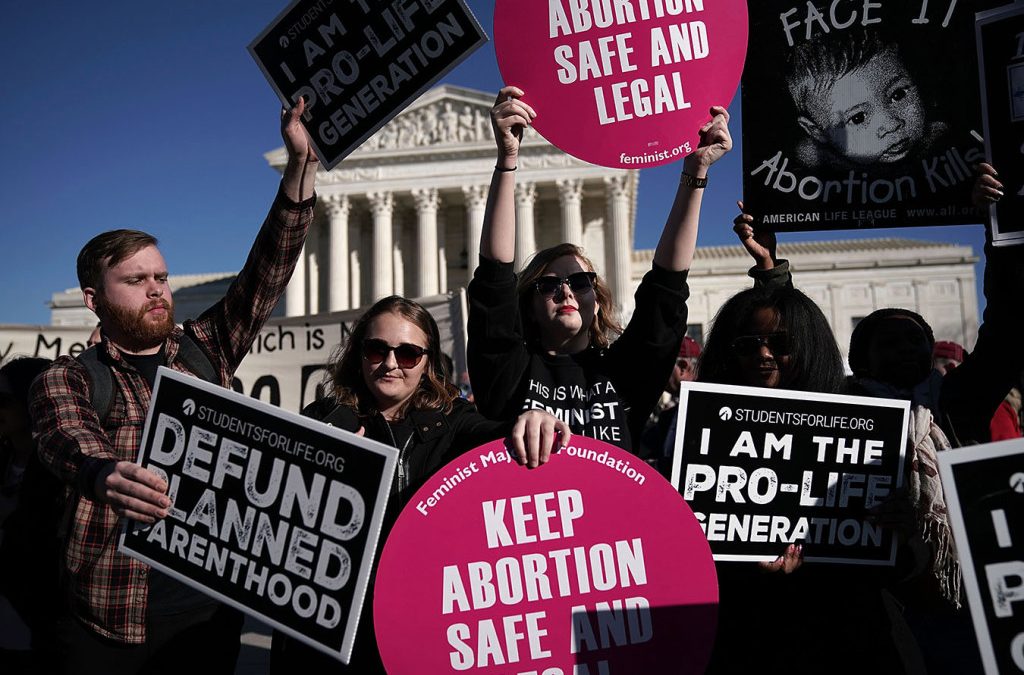The Supreme Court today provided a victory for abortion rights activists, striking down a restrictive Louisiana law that would have left the state with only one abortion clinic.
Chief Justice John Roberts joined the court’s liberals in the 5-to-4 decision.
It was a blow to conservatives who had hoped for a dramatic change in the court’s abortion jurisprudence in the first such case heard since President Trump’s two conservative appointees joined the bench.
Instead, Roberts said the Louisiana law could not stand given the court’s 2016 decision to overturn a similar Texas law in 2016.
“The legal doctrine of stare decisis requires us, absent special circumstances, to treat like cases alike,” Roberts wrote in concurring with the decision. “The Louisiana law imposes a burden on access to abortion just as severe as that imposed by the Texas law, for the same reasons. Therefore Louisiana’s law cannot stand under our precedents.”
Roberts’s vote was all the more striking because he dissented in the Texas case.
He said he continues to “believe that the [Texas] case was wrongly decided.”
But he said the question was whether to “adhere to it in the present case.”
It was perhaps the most dramatic example of Roberts’s new role as the pivotal member of the court, and indicated that while he supports restrictions on abortion, he is unready at this point to overhaul the court’s jurisprudence supporting the right of a woman to choose the procedure.
The White House issued a statement criticizing what it called an “unfortunate ruling.”
“The Supreme Court devalued both the health of mothers and the lives of unborn children by gutting Louisiana’s policy that required all abortion procedures be performed by individuals with admitting privileges at a nearby hospital,” the statement from press secretary Kayleigh McEnany said.
She added: “Unelected justices have intruded on the sovereign prerogatives of state governments by imposing their own policy preference in favor of abortion to override legitimate abortion safety regulations.”
Trump’s nominees, Justices Neil M. Gorsuch and Brett M. Kavanaugh, dissented from Justice Stephen G. Breyer’s majority decision.
Each of the court’s four most consistent conservatives wrote separately to describe their disagreement.
“Today a majority of the court perpetuates its ill-founded abortion jurisprudence by enjoining a perfectly legitimate state law and doing so without jurisdiction,” wrote Justice Clarence Thomas. “As is often the case with legal challenges to abortion regulations, this suit was brought by abortionists and abortion clinics. Their sole claim before this Court is that Louisiana’s law violates the purported substantive due process right of a woman to abort her unborn child.”
The question was whether Louisiana’s 2014 law requiring doctors at abortion clinics to have admitting privileges at nearby hospitals unduly burdens women’s access to abortion.
Practitioners have said it has proved impossible for most of the doctors to acquire the privileges, leaving only one eligible to perform the procedure.
It is almost identical to the Texas law struck down by the Supreme Court in 2016, which said the requirement did not have a medical benefit.
Now-retired justice Anthony M. Kennedy joined the court’s four liberals to form a majority in what was its most important endorsement of abortion rights in 25 years.
The Justice Department had argued then that the Texas law should be struck down. But, under Trump, the department reversed its position in the current case and backed Louisiana.
The court’s 2016 decision in the Texas case, Whole Woman’s Health v. Hellerstedt, said the admitting-privileges requirement “provides few, if any, health benefits for women, poses a substantial obstacle to women seeking abortions, and constitutes an ‘undue burden’ on their constitutional right to do so.”
Hospitalization after an abortion is rare, all sides agree, and the lack of admitting privileges by the doctor who performed the procedure is not a bar to the woman getting needed medical care.
The court’s 2016 opinion said there are numerous reasons doctors might not be able to attain admitting privileges at a nearby hospital, including the fact that it is so rare for their clients to need hospitalization.
But last fall, a panel of the U.S. Court of Appeals for the 5th Circuit upheld the Louisiana law in a 2-to-1 vote, finding factual distinctions between how the restriction played out in Texas and Louisiana.
Judge Jerry E. Smith, writing for the majority, said that the court complied with the Supreme Court’s decision in Whole Woman’s Health by taking a painstakingly close look at the details.
“Unlike in Texas, the [Louisiana law] does not impose a substantial burden on a large fraction of women,” he concluded.
He said that the closing of some clinics in Louisiana, as opposed to Texas, would not dramatically increase driving distances and that it was easier for doctors in Louisiana to procure admitting privileges.
He said that “at most, only 30 percent of women” seeking abortions in Louisiana would be affected.
The full 5th Circuit declined to reconsider the panel’s decision, and dissenting judges said their colleagues seemed more intent on giving the Supreme Court a chance to reverse its 2016 ruling than complying with it.
“I am unconvinced that any justice of the Supreme Court who decided Whole Woman’s Health would endorse our opinion,” Judge Stephen A. Higginson wrote in his dissent. “The majority would not, and I respectfully suggest that the dissenters might not either.”
Both sides in the Louisiana case had requested the court’s intervention.
Louisiana Attorney General Jeff Landry (R) had also asked the court to review the decision.
He wants the justices to decide that abortion providers don’t have the legal standing to challenge laws such as the one the Louisiana legislature passed.
